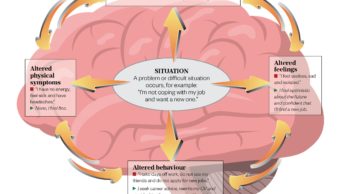
Bubbles Photolibrary / Alamy Stock Photo
Second-generation antidepressants and cognitive behavioural therapy (CBT) are equally as effective in patients with depression, researchers have found.
In a meta-analysis, published in The BMJ
[1]
on 8 December 2015, the researchers studied data from 11 randomised controlled trials involving a total of 1,511 patients. Most of the reports compared antidepressant monotherapy with CBT alone, while three studies compared antidepressant monotherapy with an antidepressant plus CBT.
At 12–16 weeks of treatment, more patients receiving CBT had achieved remission (according to the 17-item Hamilton Rating Scale for Depression or Beck Depression Inventory) than those taking antidepressants at 47.9% vs 40.7% (risk ratio [RR]=0.98]), the researchers found. However, this difference was not statistically significant.
They also compared response rates measured between 8 weeks and 16 weeks, defined by a 50% or greater reduction in 17-item Hamilton score from baseline. A similar percentage of patients receiving CBT and antidepressants achieved a response, at 45.5% and 44.2%, respectively (RR=0.91), which was also a non-significant difference.
“The benefits of second generation antidepressants and CBT do not seem to differ significantly in treating major depressive disorder,” writes Halle Amick, from the University of North Carolina in Chapel Hill, and colleagues.
They add that as patients may have their own preference for one treatment over the other, “both treatments should be made accessible, either alone or in combination, to primary care patients with major depressive disorder”.
In trials that reported change in the 17-item Hamilton score, there was no significant difference between the two treatments, after eight weeks of treatment or more. Nor did the researchers find any significant difference in the number of patients withdrawing from studies because of adverse events between the two treatment types.
Additionally, in studies that compared antidepressant monotherapy with a combination of antidepressant and CBT, the researchers found no evidence of different rates of remission or response between the groups.
The researchers note that the findings are consistent with the National Institute for Health and Care Excellence’s (NICE) guidelines on depression in adults. These recommend either antidepressants or psychological intervention (CBT or interpersonal therapy) for those with mild to moderate depression and a combination of the two treatments for those with moderate to severe depression.
“Meta-analyses like this play an important role in showing us the consistency of findings from mental health research over time,” says Rachel Boyd, information manager for the mental health charity Mind. “We do, however, need to be aware that there are limitations to the research and, as with all areas of mental health, there is still further research that needs to be done.”
Such limitations include the fact that the data for rates of remission and response were taken from only three and five reports, respectively, as noted by the authors of an accompanying editorial in The BMJ
[2]
.
“NICE guidelines around the treatment of depression set out clear evidence-based guidance on treatment options. Doctors should, however, also work with patients to find out what works for them,” says Boyd.
“While we know that CBT is still the most widely prescribed form of therapy through the Improving Access to Psychological Therapies programme, and the right treatment for many people, it isn’t suitable for everyone. It is important that people have the proper ability to make choices,” she adds.
References
[1] Amick HR, Gartlehner G, Gaynes BN et al. Comparative benefits and harms of second generation antidepressants and cognitive behavioral therapies in initial treatment of major depressive disorder: systematic review and meta-analysis. The BMJ 2015;351:h6019. doi:10.1136/bmj.h6019
[2] Sinyor M, Fefergrad M, Zaretsky A et al. Cognitive behavioural therapy or antidepressants for acute depression? The BMJ 2015;351:h6315. doi:10.1136/bmj.h6315


